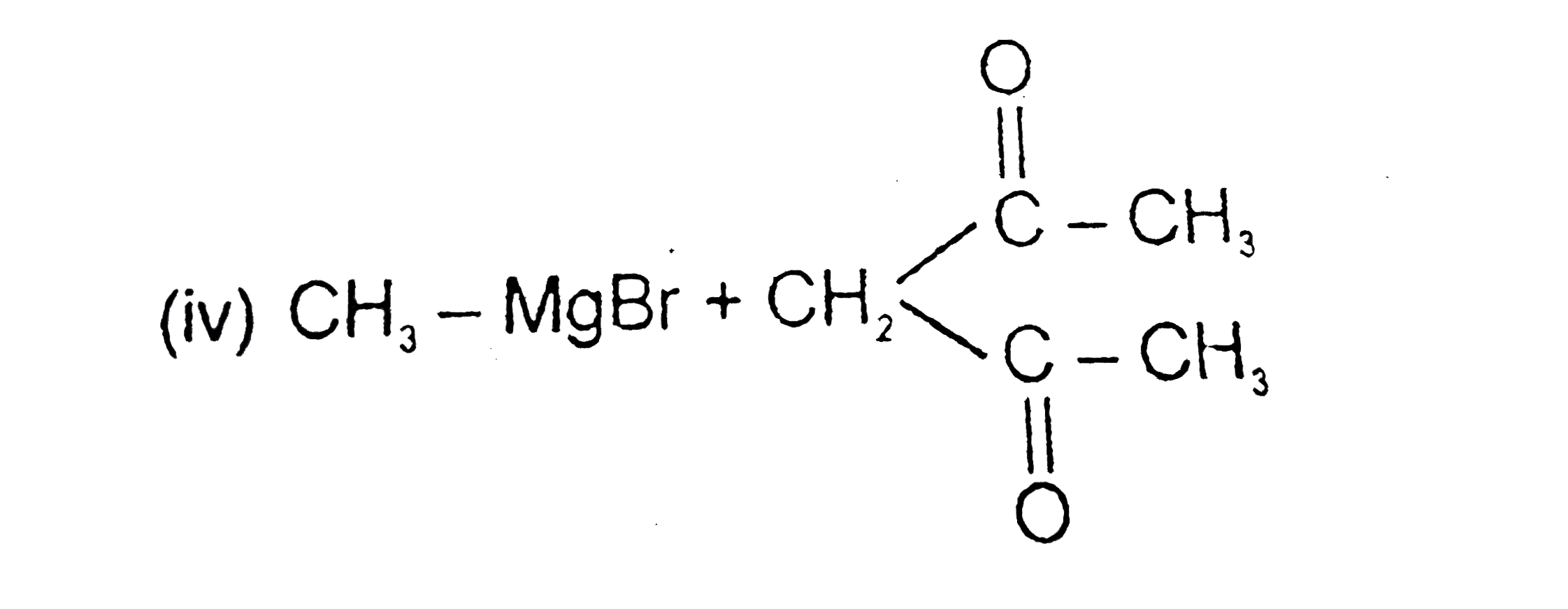Which of the following can produce CH4on reaction with CH3Mgl?
C2H5NH2
C2H5OH
(CH3)3N
Both(1) and(2)
To determine which of the given compounds can produce CH₄ (methane) upon reaction with CH₃MgI (methylmagnesium iodide), we will analyze each option step by step.
1. Identify the Reactant: The reactant we are working with is CH₃MgI, which is a Grignard reagent. Grignard reagents react with various electrophiles to form new carbon-carbon bonds or to produce hydrocarbons.
2. Examine Option 1: C₂H₅NH₂ (Ethylamine):
- Reaction:
C2H5NH2+CH3MgI→C2H5N(CH3)+MgI(OH)
- This reaction will produce an amine (C₂H₅N(CH₃)) and a magnesium salt, but it does not produce CH₄. Thus, this option does not yield methane.
3. Examine Option 2: C₂H₅OH (Ethanol):
- Reaction:
C2H5OH+CH3MgI→CH4+C2H5O−MgI+
- In this case, ethanol reacts with the Grignard reagent to produce methane (CH₄) and a magnesium alkoxide. This option does produce methane.
4. Examine Option 3: CH₃N(CH₃)₂ (Dimethylamine):
- Reaction:
CH3N(CH3)2+CH3MgI→Noreaction
- Dimethylamine does not react with CH₃MgI to produce methane. Therefore, this option does not yield methane.
5. Conclusion:
- From the analysis, we find that only the second option (C₂H₅OH) produces CH₄ when reacted with CH₃MgI. The first and third options do not produce methane.
Final Answer:
The correct option is C₂H₅OH (Ethanol), which can produce CH₄ on reaction with CH₃MgI.
- Reaction:
C2H5NH2+CH3MgI→C2H5N(CH3)+MgI(OH)
- This reaction will produce an amine (C₂H₅N(CH₃)) and a magnesium salt, but it does not produce CH₄. Thus, this option does not yield methane.
- Reaction:
C2H5OH+CH3MgI→CH4+C2H5O−MgI+
- In this case, ethanol reacts with the Grignard reagent to produce methane (CH₄) and a magnesium alkoxide. This option does produce methane.
- Reaction:
CH3N(CH3)2+CH3MgI→Noreaction
- Dimethylamine does not react with CH₃MgI to produce methane. Therefore, this option does not yield methane.
- From the analysis, we find that only the second option (C₂H₅OH) produces CH₄ when reacted with CH₃MgI. The first and third options do not produce methane.
The correct option is C₂H₅OH (Ethanol), which can produce CH₄ on reaction with CH₃MgI.
Topper's Solved these Questions
Similar Questions
Which of the following compounds shall not produce propene by reaction with HBr followed by elimination or direct only elimination reaction?
(a)CH3CH2CH2Br
(b)CH2=C=O
(c)CH3CH2CH2OH
(d)None of these
View SolutionWhich one of the following will produce a primary alcohol by reacting with CH3MgI?
View Solution
Knowledge Check
Which of the following can distinguish?
CH3−CH3∣CH−NH2andCH3−CH2−H∣N−CH3A(COOC2H5)2BNaNO2+HCICCS2,HgCI2DAg2O,ΔCH3−CH2−CH2−CH2−CH3CH2N2/Δ−−−−−−→ Products
Which of the following product(s) is/are can be obtained in the above reaction.AIsopentaneB3-Methyl hexaneCn-PentaneD3-Methyl pentane
In which of the following reaction CH4 will be obtained?
i. CH3−MgBr+CH3−C≡CH
ii.
iii. CH3−MgBr+CH3OH
iv
View SolutionWhich of the following compounds can form carbanion easily ?
I. CH3CH2 II. CH3CHO III. CH3CH2Cl IV.
The correct choice is :
View SolutionThe increasing order of reactivity of the following halides for the SN1 reaction is
I.CH3CH(CI)CH2CH3
II.CH3CH2CH2Cl
III. p.−H3CO−C6H4−CH2Cl
View SolutionWhich compound in each of the following paris will react faster in SN2 reaction with HOo− ?
a.CH3Br or CH3I
b. (CH3)3Cl or CH3Cl
c. CH2=CHBr or CH2=CH−CH2Br
View SolutionWhich compound in each of the following pairs will react faster in SN2 reaction with .–OH ?
(i) CH3BrorCH3I,(ii)(CH3)3CClorCH3Cl
View SolutionWhich one of the following compounds is more reactive towards SN2 reaction and why ? CH3CH(Cl)CH2CH3orCH3CH2CH2Cl
View Solution
